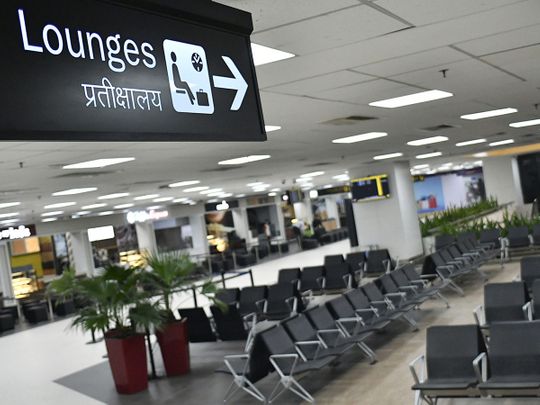They could start to get busy soon – Indian airports will see a full return of international flights from November. Will this mean rate cuts on India-UAE routes?
Image Credit: Bloomberg
Dubai: If India goes ahead and restores normal air services to the UAE and other countries from November 1, ticket prices could drop immediately.
Based on the initial booking data, fares from New Delhi to Dubai could drop to Dh900-Dh1.7000 in the early days of November, while those from Mumbai could drop below Dh2,000. Kochi-Dubai flights start from 960 Dh, and the one from Thiruvananthapuram can cost up to 1,800 Dh.
Meanwhile, flights from Dubai to New Delhi and Mumbai, which until last month were Dh300 to Dh500, could see significant increases. In addition to rapidly rising fares, passengers from India must also bear the cost of a rapid PCR test, which must be performed within six hours of departure. Depending on the airport in India, these can cost Dh190 to Dh220.
“Rapid PCR kits are expensive – there is a travel agreement between India and the United Arab Emirates that requires COVID testing before boarding the flight to the United Arab Emirates. Also, for Europe,” said one user on a Twitter thread where people bemoan the high cost of testing at Indian airports.
Catering services
Regardless of the immediate impact on fares, November 1 will mark a significant shift for global airlines on their outlook in India. After repeatedly postponing the resumption of international services, India’s civil aviation authorities have finally set November for a return after COVID-19 created disruption.
So far, India has entered into an “air bubble” deal with the United Arab Emirates, which limits the number of flights operated on the route. “Fares on the India-UAE route currently, particularly to Dubai, are astronomically priced largely due to a limited supply of seats and unprecedented demand for travel,” said Vinamra Longani, manager. operations for Sarin & Co, an Indian law firm specializing in aircraft leasing and financing. “If the Indian government allows airlines to increase capacity, whether through an enlarged air bubble or resuming scheduled flights, fares should come down.”
India had previously announced that it would grant tourist visas to foreigners wishing to come to India on chartered flights as of October 15. Those traveling to India on flights other than chartered planes could do so from November 15.
“It now makes sense to revoke the suspension of scheduled flights and completely drop the air bubble provisions,” Longani added.
High season
The UAE, which hosts Expo 2020 and the T20 World Cup, is entering its peak tourist season, which starts from November and continues through March. This too could have a say in ticket prices. “We do not expect a drastic reduction in tariffs on the UAE-India sector,” said Suraj Ramesh, tour manager at Al Badie Travel Agency.
Air India will announce new routes in the coming months, including a direct flight from Dubai to Goa, Ramesh said. “When these kinds of additions happen, you get a reduction in fares in an area like Mumbai – a lot of people in Dubai connect to Goa using that particular route.”
Air India Express, the budget unit of India’s flagship carrier, will resume flights between the city of Kozhikode and Al Ain in southern India in December, according to booking sites. Ramesh agreed that a return to pre-COVID-19 schedules will be necessary for airline ticket prices to be impacted. “I think three or four flights a week is really not going to bring the fares down significantly.”
Cost of tests
While removing restrictions in favor of PCR testing is the norm around the world, airlines have warned that the high cost of COVID-19 testing could actually weigh on travel demand.
“In addition to being reliable, the tests must be easily accessible, affordable and appropriate for the level of risk,” said Willie Walsh, chief executive of IATA, in a statement released earlier this year. “Too many governments, however, fail at some or all of these elements – the cost of testing varies widely from jurisdiction to jurisdiction, with little relation to the actual cost of performing the test.”
Air bubble rationale
India operating flights under air bubble deals has given the country’s airlines an edge. The “India First” approach on some routes ensures that Indian carriers do not face direct competition from operators in the UAE or other countries.
In August, Sharjah’s Air Arabia chief Adel Ali called for an open skies policy between the UAE and India instead of an air service agreement between the two countries. An open air service agreement allows airlines of the two countries to have an unlimited number of flights as well as seats to the jurisdictions of the other.
Ali said that some protective measures taken by Indian authorities are slowing Air Arabia’s growth in the Indian market. “Thanks to what India has done, our business with a number of other sub-continents (countries) has grown. “

